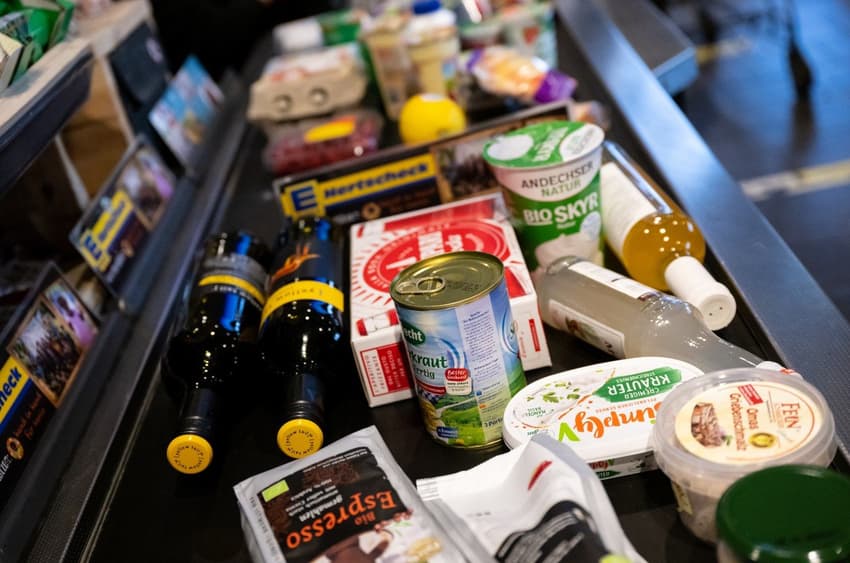Soaring food prices continue to drive inflation in Germany

Inflation has been dropping over the past few months in Germany - but customers are still feeling the pinch at the supermarket checkout, new stats reveal.
Inflation stood at 6.2 percent in the month of July, official figures from the Federal Office of Statistics (Destatis) revealed.
This marks a slight drop against June's figure of 6.4 percent and continues the downward trend in inflation this year.
But food prices remain far higher than they were a year ago, putting a strain on consumers' wallets and driving a faster-than-normal rise in the cost of living.
According to Destatis, food prices in July 2023 were on average 11 percent higher than they were in July 2022. In June, this figure was 13.7 percent.
Almost all food groups had seen a significant jump over the past 12 months.
In particular, consumers had to pay noticeably more for sugar, jam, honey and other confectionery (+18.9 percent).
Bread and cereal products (+16.6 percent), vegetables (+15.7 percent), as well as fish, fish products and seafood (+14.1 percent) also became noticeably more expensive within a year.
READ ALSO: EXPLAINED: 10 ways to save money on your groceries in Germany
In a rare exception, edible fats and oils had become 12.9 percent cheaper than they were a year earlier, when supermarkets were experiencing major supply chain issues in the wake of the Ukraine war.
"The inflation rate has moderated somewhat, but remains at a high level," explained Destatis president Ruth Brand. "In particular, the price development of food continues to drive inflation."
Rise in energy prices
For several months now, households in Germany have been facing record levels of inflation that have eaten away at their spending power.
Last autumn, the rise in the cost of living hit its highest level since German reunification at 8.8 percent. For the year as a whole, inflation stood at 7.9 percent.
A major driver of spiralling prices has been the soaring cost of energy products like gas and oil. Due to supply shortages in the wake of the pandemic and Russia's invasion of Ukraine, the price of energy rose significantly across the Eurozone, pushing up costs for business and driving up the cost of goods.
Though the market has stabilised again in recent months, Destatis did report a 5.7 percent rise in the cost of energy products year-on-year in July.
READ ALSO: Why is inflation rising again in Germany?
With a 17.6 percent rise in prices, electricity showed the most dramatic inflation rate, with natural gas in second place at 8.5 percent.
In contrast, despite the three-month fuel discount (or Tankrabatt) last summer, petrol and diesel were also 4.9 percent cheaper than a year ago.
In summer 2022, the €9 ticket also helped to dampen inflation. With the recently launched €49 ticket significantly more expensive than its predecessor, this effect has not come into play this year.
Comments
See Also
Inflation stood at 6.2 percent in the month of July, official figures from the Federal Office of Statistics (Destatis) revealed.
This marks a slight drop against June's figure of 6.4 percent and continues the downward trend in inflation this year.
But food prices remain far higher than they were a year ago, putting a strain on consumers' wallets and driving a faster-than-normal rise in the cost of living.
According to Destatis, food prices in July 2023 were on average 11 percent higher than they were in July 2022. In June, this figure was 13.7 percent.
Almost all food groups had seen a significant jump over the past 12 months.
In particular, consumers had to pay noticeably more for sugar, jam, honey and other confectionery (+18.9 percent).
Bread and cereal products (+16.6 percent), vegetables (+15.7 percent), as well as fish, fish products and seafood (+14.1 percent) also became noticeably more expensive within a year.
READ ALSO: EXPLAINED: 10 ways to save money on your groceries in Germany
In a rare exception, edible fats and oils had become 12.9 percent cheaper than they were a year earlier, when supermarkets were experiencing major supply chain issues in the wake of the Ukraine war.
"The inflation rate has moderated somewhat, but remains at a high level," explained Destatis president Ruth Brand. "In particular, the price development of food continues to drive inflation."
Rise in energy prices
For several months now, households in Germany have been facing record levels of inflation that have eaten away at their spending power.
Last autumn, the rise in the cost of living hit its highest level since German reunification at 8.8 percent. For the year as a whole, inflation stood at 7.9 percent.
A major driver of spiralling prices has been the soaring cost of energy products like gas and oil. Due to supply shortages in the wake of the pandemic and Russia's invasion of Ukraine, the price of energy rose significantly across the Eurozone, pushing up costs for business and driving up the cost of goods.
Though the market has stabilised again in recent months, Destatis did report a 5.7 percent rise in the cost of energy products year-on-year in July.
READ ALSO: Why is inflation rising again in Germany?
With a 17.6 percent rise in prices, electricity showed the most dramatic inflation rate, with natural gas in second place at 8.5 percent.
In contrast, despite the three-month fuel discount (or Tankrabatt) last summer, petrol and diesel were also 4.9 percent cheaper than a year ago.
In summer 2022, the €9 ticket also helped to dampen inflation. With the recently launched €49 ticket significantly more expensive than its predecessor, this effect has not come into play this year.
Join the conversation in our comments section below. Share your own views and experience and if you have a question or suggestion for our journalists then email us at [email protected].
Please keep comments civil, constructive and on topic – and make sure to read our terms of use before getting involved.
Please log in here to leave a comment.